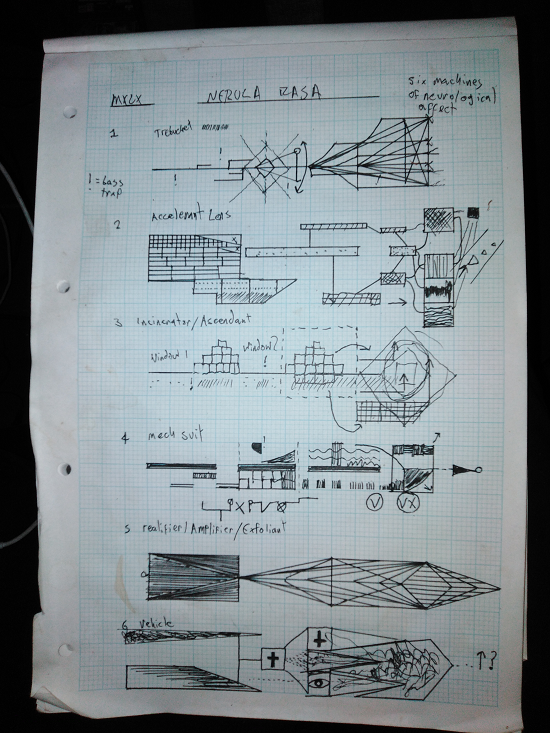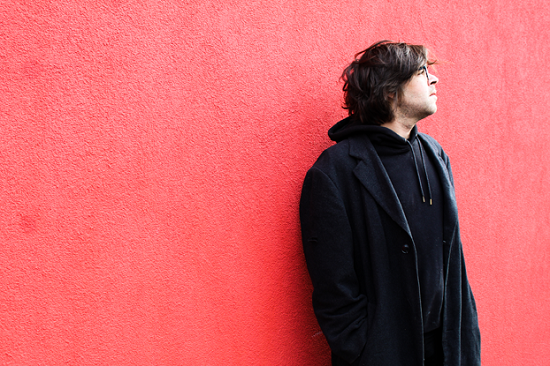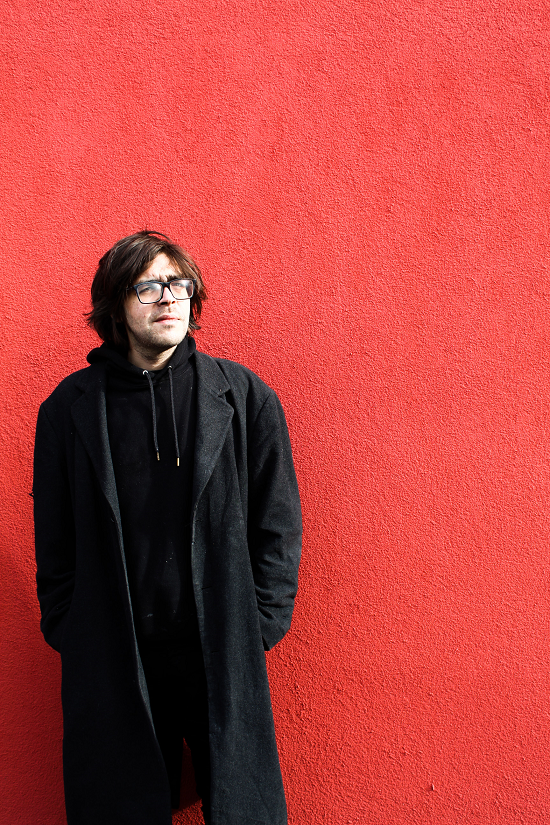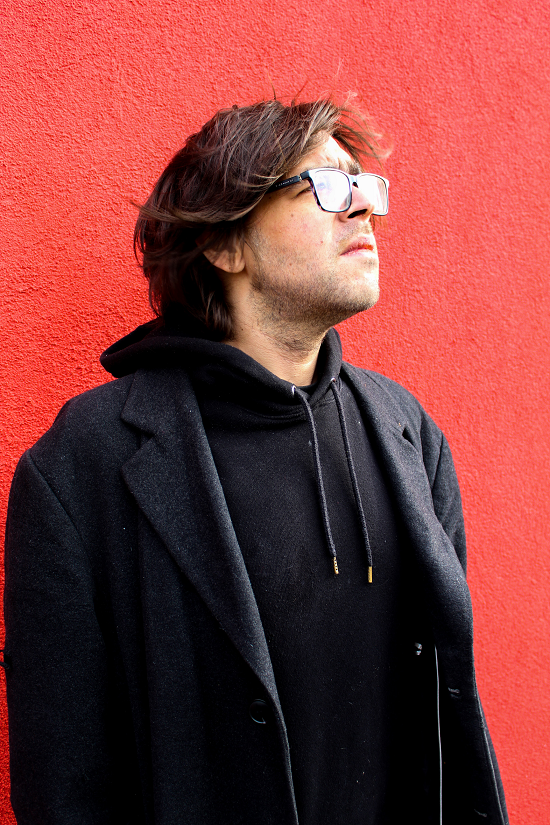Prolific Bristol-based musician Matthew Loveridge began work on his new album under his principal moniker MXLX, Nebula Rasa, last April. “It started with the title,” he tells tQ in an email exchange, “an obvious play on ‘Tabula Rasa’ coupled with my terrified affection for Boötes void,” referring to the enormous section of space in which almost no galaxies exist, also known as The Great Nothing. Beginning with his unique scores, where the attack and decay of music is expressed through geometric patterns and symbols – you can take a look at some examples below – he spent five weeks getting his ideas together, then another few months working on arrangements. By September he was averaging between 70 and 80 tracks of audio per piece, “because I have a hard-on for texture and counterpoint.”
A tremendous album was taking shape, a pummelling and distressed piece of electronic maximalism. But then, while he and his partner had “popped off to ALDI to get some teabags and steak,” they returned to find out they’d been robbed. His laptop, and by extension the entirety of his work so far, was lost. “I already got told off on Reddit for not backing my stuff up, so yes, I am a stupid ass,” he says. “I know. Being clever is not in my wheelhouse.

Scores for Nebula Rasa
“It’ll come as no surprise to hear that the police were worse than useless,” he continues. They told me it’d cost too much money and take a week to find the laptop, if it was at all possible. Basically, they couldn’t be arsed, just wanted to fob me off with a crime number and fuck off back to donutland. To their credit, after the burglary they did hit the neighbourhood with a very aggressive and forceful leafleting campaign, which warned our neighbours to not be as thick as shit as me, and to just make sure not to get burgled, saving them doing anything of any real worth.”
After Loveridge had “cried all the moisture out of my body,” however, he realised that the thieves had forgotten to turn off the phone they’d also stolen. Using a ‘find my phone’ tracker, “all I had to do was a quick Google search on the last known location of the thing, and the pin dropped right on a house a couple of miles away.” Not only was the laptop still there and untouched – “probably because it was filthy with my fingerdirt” – Cubase was still running on the track he was working on. “How we got it back is not gonna be talked about,” Loveridge says. “The police were awful sore that we did their job better than them though. That was kinda delicious.”
All he had left to add were the vocals. “At this point I was a complete nervous wreck, but they were all finished and put to bed by early October. Then I collapsed and had a three-day panic attack, losing my entire shit and crying my eyes out watching that last episode of Midnight Gospel.” Loveridge has never enjoyed writing lyrics, but loves “the voice as an instrument and all it can do. I never got on board with words having to convey meaning or intent through a piece of music, or explicit meaning in music at all. I’m more about the ‘why’ and ‘how’ the music exists in the first place, not the ‘meaning.’” The words on Nebula Rasa are delivered often in a harsh, guttural scream, their explicit meaning obfuscated by a whirl of noise, but their power very much apparent.
To my ears at least there’s a more notable screamo/metalcore influence going on with Nebula Rasa compared to your last album. What’s your relationship with that kind of music like?
Short answer is, I am and always have been a huge metalhead. I grew up on Metallica, Faith No More, Sepultura etcetera. I’m still a massive devotee to the heavy, I can’t get enough Deftones and Slipknot and Converge, plus all the gnarly new shit still coming out. My attachment to metal and hardcore is the same as my attachment to music in general, I listen to it for the emotive quality, and I find I get the most in and out of the heavy stuff emotionally, probably because I’m not that great at processing emotions or understanding the slippery things.
I went through a real unfortunate phase in my mid 20s where I completely denounced anything heavy, and I guess I’m making up for lost time. All that changed when I remembered how sick White Pony is, then it was all riffs from there on in. As soon as I finished Nebula I went straight on to the new [separate Loveridge project] Fairhorns album, which is just straight up metal.
That the influence is only noticed now is kind of odd, but I get it. Way back in 2014 when I did the Fairhorns MEDICI EP, that was all straight-up garage-metal too. I literally recorded in my parents’ garage, ended up getting sick at the end of recording and had to go to A&E with a bad case of double herpes in the eyes. Which in itself was pretty hardcore. Basically, I love a good scream. It’s always so emotive and warm to me, that white-noise false-cord sound always gets me grinning. It’d be sick if screams were used more in other kinds of music, which it totally is in a load of new trap. You’ve got folk like Backxwash, Scarlxrd, Moor Mother even, all going the hardcore vocal route. You love to see it.

Your last album Serpent was met with loads of acclaim. Did that record feel different to past releases?
Serpent, man…… that was H A R D. A big old violent freakout that saw me all fucked off and up with music in 2017, which coincided with a little homeless stint. Not something I want to repeat, but it was something of an adventure. It sucked, but the reality of it made it impossible to rest on my status quo of waddling around in a little anxious piss-puddle. That started coming together in early 2018, when I finally found a place to live in what was basically a shack above a supermarket. The place was rickety as fuck, the walls would shake and the windows would rattle when people were arguing outside. Synths balanced on windowsills and guitars recorded in the toilet ‘cause it was the only quiet place in the building, all of it recorded on a Zoom digital Dictaphone, a dumbass process I still do today because I am generally a luddite. The most part of 2018 was pure anhedonia, I spent most of it trying to feel anything other than defeated.
The last track on Serpent is ‘The Day I Crawled Into The Sun’, and the first track on Nebula Rasa is ‘The Day I Crawled Out Of The Sun’. How do the two albums relate to one another?
Nebula Rasa and Serpent are not completely different. I felt like I hadn’t quite done enough with this phase of MXLX stuff, the more synth-based, song-based approach, and had a little boost of confidence, which is fucking rare for me. I wanted to put it to bed in a more fitting way, in and out of the sun being a hint. Serpent was something of the 40 days and nights in the desert, Nebula is FULL CHRIST, or something. Sorry that sounds pompous as fuck, please don’t bite me. Serpent equals me trying to feel anything, Nebula Rasa equals feeling everything, I guess. The scores for Serpent were different too, a lot more lost, as was I when I did the thing. Serpent lived with trauma and Nebula processed it, maybe? I don’t know. I don’t want to try and attempt to psychoanalyse myself, as I’ll just end up pointing at my bellybutton and claiming it’s Atlantis or something. I’m always well shy of the mark.
There is also an aesthetic difference between the two that is probably more important to me than anyone else, but it’s that Serpent is more a trad album, Nebula Rasa was always written as six ‘machines’, rather than songs or pieces.

Did you feel any pressure following Serpent’s success?
I’m lucky in that there is no external pressure at all with my work, only the pressure I put on myself, which really isn’t much. When I’m in the flow-state I’m pure tunnel-vision ‘til the end, ‘til I’ve named everything and done the artwork and got it sent off for pressing. It’s good to realise that the flipside of what we know as ‘success’ is true independence, even at the cost of all the other, probably beneficial, stuff that goes with it. It’s definitely better for me to be as DIY as possible, so I can just keep on with the work on my own steam and speed and take turns whenever my curiosity turns that particular wheel. I try to make the best music I can, at any time with the limited stuff I’ve got though. I’ve been recording everything on the same Zoom Dictaphone for years and I’m still surprised I can make records that sound ok on it. The mess on the recording and the mess in the mix and the mess in the playing mightn’t be there in the same way otherwise, and I’ve come to be kind of fond of my own shoddiness. The added benefit for me of being DIY is I get to say FUCK OFF to all streaming platforms. I hate all streaming platforms, fuck it I’m old and out of touch but I knows what I likes. My stuff ain’t on Spotify, fuck Daniel Ek all day. Wasteman.
When beginning a new record, do you react in any way to what you’ve just produced before? Do you like to build on past experiments, or do you just start completely from scratch?
Every single fucking record I do feels like I’m back on square one. I’ve done 59 debut albums, always looking at what I’ve gotten wrong the last time and going ‘how can I nail that bit?’ then nailing it, never to return, and getting something else wrong so I’ve got always got something to return to. I don’t really build on past experiments ‘cause I feel like if I’ve done what I needed to do, it’s done.
Nebula Rasa by MXLX is out now via Kindarad. You can purchase it here


